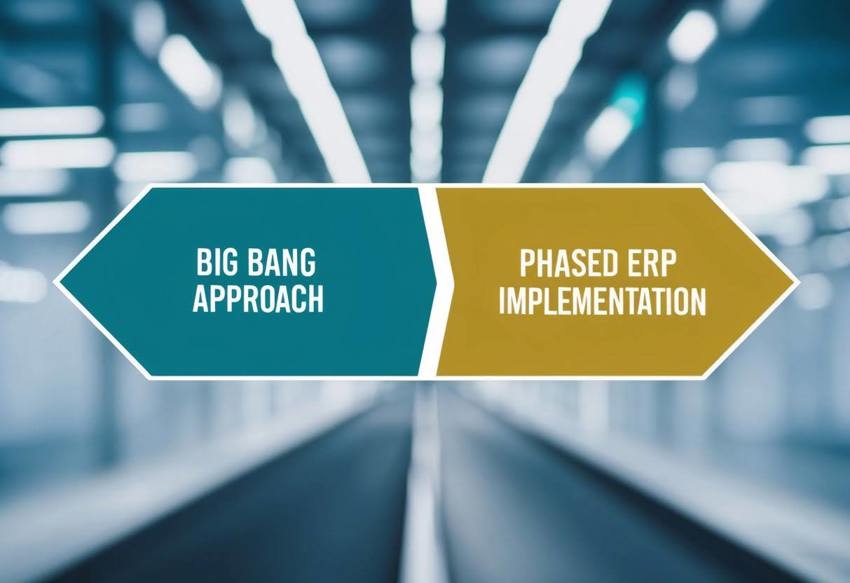What’s New in Business Central 2025 Release Wave 2
The Autumn brings the second major release of the year for Business Central, as part of the 2 wave annual update cycle. Here we look at the highlight features.
If you work with an older, outdated ERP/CRM solution that needs to be replaced urgently, or you need an upgrade to a later version, you have the opportunity to modernise your legacy business processes and fix the broken ones. With this long-awaited move, a wealth of innovative new technologies like artificial intelligence can be a part of your system.

Your implementation strategy can impact the success of your project. Two key approaches are the big bang and phased methods. The big bang approach involves switching all parts of your ERP system simultaneously, while the phased approach gradually rolls out the system in steps.
If your business can handle big changes quickly, the big bang approach could be suitable. However, few businesses are realistically prepared for this. On the other hand, if you prefer mitigating risk and rolling out changes gradually, the phased approach might be preferable. To understand the best method, you'll need to consider your business objectives, priorities and the capabilities of your implementation team.
Understanding both methods ensures a successful ERP implementation tailored to your needs. Collaborating with experienced implementation partners like Dynamics Consultants and aligning with your business priorities can help you choose the right path.
We're helping businesses implement Dynamics 365 every day. And we see the same challenges occur over and over again:
Huge and long-lasting implementations with a wide and flexible project scope and complex migrations can be problematic if not handled with care and experience. Often, the problems become greater than the benefits, leading to a higher level of risk. And the possible disruption of your day-to-day operation can cause a reduction of customer loyalty. Or even worse.
Implementing new software like Dynamics 365, adapting and modernising your business processes and creating a fresh, new company culture means an enormous effort for your business. And it demands a lot from your teams. Especially because you also have a business to run. So, the alternative for a big-bang approach is to split the project into several smaller steps and have the discipline to stick to the plan.
Choosing between the big bang and phased ERP implementation strategies can affect your business operations. Each approach has its own unique benefits and potential drawbacks. You need to consider factors like project complexity, resource availability and risk tolerance to make the best decision for your company.
The big bang approach involves switching your entire ERP system at a single point, offering a decisive transition for your business processes. This method provides a shorter implementation timeline as everything goes live simultaneously, reducing the drawn-out implementation period.
This strategy can lead to cost savings in terms of reduced project management and quicker realisation of business benefits. However, it carries a higher risk of failure because the testing phase may not be as comprehensive, and inadequate preparation can lead to disruptions in operational continuity. A solid effective change management strategy and detailed planning, involving all key stakeholders, can help to ensure a smooth transition.
The phased approach rolls out the ERP system gradually in segments over a period, allowing for a smoother, incremental approach to changing business activities. This method facilitates a gradual transition with sufficient time for parallel testing and adjustments, allowing your project team to see how it affects business processes.
One advantage of this strategy is minimising risk, as each phase can be thoroughly tested and adjusted before the next begins. This process can also reduce potential disruptions, ensuring continuous business operations.The phased approach might incur additional time and costs, as the project stretches over a longer duration, so it's important to weigh up your priorities in your ERP rollout.
When choosing your ERP implementation approach, consider your business's specific needs and operational goals. Evaluate your company’s risk tolerance and readiness for change. Assess the complexity of your business processes and the availability of resources, including personnel and budget.
Look into regulatory compliance demands and any interim period constraints that might affect your implementation process. Engage with key stakeholders to align on priorities and expectations. Ensure an effective change management strategy to support your project team and maintain momentum throughout the implementation. The choice between big bang and phased should align with your strategy for the transition and long-term operational success.
Successfully implementing an ERP system requires careful planning and resource management. By focusing on strategic planning, managing expectations and monitoring the process, your organisation can minimise disruptions and achieve its business goals.

Begin with strategic planning to align the ERP implementation with your business goals. Assess your business landscape to identify potential disruptions or roadblocks. Look at your risk level and evaluate scope creep to prevent extending beyond the agreed project scope.
Involve key stakeholders in the planning process. Their input is important for identifying potential risks and crafting a deployment approach tailored to your business needs. Use document management systems like SharePoint to maintain thorough records of the implementation cycle, helping ensure business continuity during changes.
Make sure you have proper resources available, such as skilled personnel and consulting expertise, to mitigate risks like inadequate training. Resource availability can impact the entire business if not handled properly.
Be clear about expectations by establishing communication strategies with business managers and departments. These strategies prevent misunderstandings and help manage expectations throughout the implementation. Align resource allocation with your business goals to optimise the efficiency of the implementation methods and reduce unnecessary consulting costs.
Keep a close eye on the implementation cycle to ensure it meets business objectives. You can introduce a parallel implementation if necessary to maintain business operations during the transition. This approach provides a safety net against potential failures.
Regularly review and adjust the implementation process based on feedback from your teams. Emphasise an effective change management strategy to address any issues promptly. Conduct an assessment of risks periodically to identify and address any concerns early on. This proactive approach allows you to adapt swiftly in response to any unforeseen challenges or additional scope that may arise.
Having seen the disruption and additional costs caused by so many big bang implementations, we'd always recommend a phased implementation with a series of smaller project steps. A shorter ‘time-to-value’, the possibility to adapt more quickly to changing circumstances and a smoother transition period are just a few of them.
It is no longer the right mindset to implement a perfect ERP or CRM solution that you'll then use for a relatively short period of time of around 5-10 years. It’s more effective to consider your digital transformation journey as a process rather than an entire project. A process is never finished - only improved upon as time goes on.
Understanding ERP implementation strategies helps businesses make informed decisions. Key considerations include the advantages and disadvantages of each approach, suitable scenarios for implementation and the impact on project management.

A phased ERP implementation introduces changes gradually, reducing risk and allowing adjustments as you proceed. This method can minimise disruptions in daily operations. In contrast, the big bang approach allows for a quick deployment, but is riskier.
The big bang approach involves deploying the entire ERP system at once. Businesses switch to the new system at a specific point, replacing the old system. This method demands significant planning, making sure that the system is configured and tested thoroughly before go-live.
A phased ERP implementation is beneficial for complex organisations with various business units or departments. This approach allows for tailored solutions and adjustments specific to each area of operation, making it ideal for large companies or those with intricate processes.
When deciding on ERP deployment strategies, consider the complexity of your operations, the available resources and the urgency of the implementation. Assess whether your team can handle the risk of a single deployment or prefers a gradual rollout, allowing for adjustments and learning.
The Big Bang approach requires intensive project management, with detailed planning and coordination across all departments. Your team must address potential challenges swiftly, ensuring that support and training are available to handle the transition to the new system effectively.
The Autumn brings the second major release of the year for Business Central, as part of the 2 wave annual update cycle. Here we look at the highlight features.
After a recent visit to the Digital Manufacturing 2day event in Coventry and an insightful presentation by Lord Chris Holmes, I thought I would delve a bit deeper into the current AI regulation facing UK industry.
Choosing the right ERP system when moving on from Sage 50 can shape how efficiently your business grows and adapts. If you want advanced features, greater flexibility and easier integration with familiar Microsoft tools, Microsoft Dynamics 365 Business Central is often the stronger option compared to Sage 200. As real-time data insight, automation and scalability are now necessities and not luxuries, your ERP upgrade decision is more important than ever.